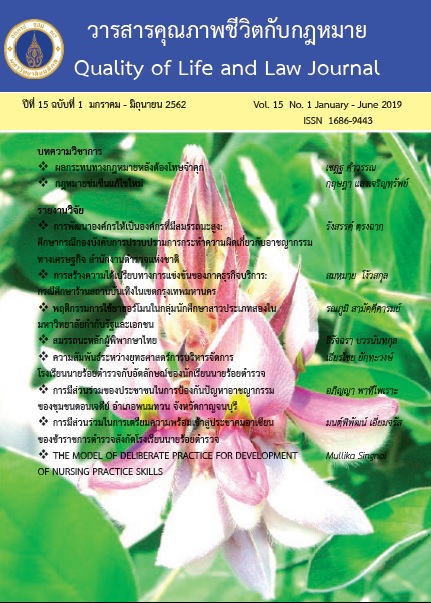Development of Police Bureau of an Economic Crime Suppression for High Performance Organization
Main Article Content
Abstract
The objectives of this study were to delineate Police Bureau of an Economic Crime Suppression for High Performance Organization as well as factors that effect on such platform and developmental approach such bureau. Three hundred and eighty four police officers who worked in the Police Bureau of an Economic Crime Suppression were sampled. The data was collected by questionnaire and analysis through ANOVA.
The results can be summarized as follows: 1. In terms of personal background, most of the participants were sergeant male police with aged 31-40 years, married, had a Bachelor’s Degree and had worked in their organizations more than 9 years. They are taking care of the money for their family members. The income level ranged more than 20,001 Baht per month. Apart from this, as for the performance factors, they also agreed with the democratic leader and good organizational communication. 2. As far as high performance organization viewpoint is concerned, most of the sample police officers expressed at high level of opinion on leadership and strategic planning, outcome performance, the client and stakeholder services, human resources development and management respectively. Be that as it may, they expressed at the lowest level of their opinion on knowledge measure analysis and management. 3. Factors related with developing Police Bureau of an Economic Crime Suppression for High Performance Organization depending on age, monthly income, and work time period, leadership and communication aspects in the organization.
Recommendations from this study are that there is a need to review the annual performance, integrating strategic scheme with the missions and survey for satisfaction of the client, provide the person career path obviously and upgrades innovation to work process. Similarly, comparative studies that looked at other police units and police stations in urban areas and in other police units including the qualitative approach would also be useful.
Article Details
- บทความหรือข้อคิดเห็นใดๆ ในวารสารคุณภาพชีวิตกับกฎหมายเป็
- กองบรรณาธิการไม่สงวนสิทธิ์
References
ชรินทร จุลคประดิษฐ์. (2548). หลักการบริหาร. กรุงเทพฯ: อภิชาตการพิมพ์
ทิพวรรณ หล่อสุวรรณรัตน์. (2552). ทฤษฎีองค์การสมัยใหม่. กรุงเทพฯ : บริษัท ดี.เค.ปริ้นติ้งเวิลด์จำกัด.
นิสดารก์ เวชยานนท์. (2551). มิติใหม่ในการบริหารทุนมนุษย์. กรุงเทพฯ: กราฟิโก ซิสเต็มส์ จำกัด.
เปี่ยมพงศ์ นุ้ยบ้านด่าน. (2543). องค์การแห่งการเรียนรู้. วารสารการศึกษาพยาบาล 10(3) : 13-17.
พรธิดา วิเชียรปัญญา. (2547). การจัดการความรู้ : พื้นฐานและการประยุกต์ช้ .กรุงเทพมหานคร : ธรรกมลการพิมพ์.
พสุ เดชะรินทร์. (2550). องค์การแห่งการเรียนรู้ วัฒนธรรมองค์การ. ผู้จัดการรายสัปดาห์. ปีที่ 20 ฉบับที่ 1064.
พิเชฐ อุดมรัตน์. อ้างถึงใน http://medinfo.psu.ac.th/KM/data/media/media_in_001.htm
วีระวัฒน์ ปันนิตามัย. (2544). เอกสารประกอบการสัมมนาเชิงวิชาการ. องค์การแห่งการเรียนรู้. ภาควิชาการจัดการ คณะบริหารธุรกิจ มหาวิทยาลัยพายัพ.
สุเทพ พงศ์ศรีวัฒน์. (2545). ภาวะผู้นำ : ทฤษฎีและปฏิบัติ. กรุงเทพฯ : สำนักพิมพ์บุ๊คส์ลิงค์.
อาภรณ์ ภู่วิทยพันธ์. (2551). กลยุทธ์การพัฒนาทรัพยากรมนุษย์. กรุงเทพฯ : บริษัท เอช อาร์ เซ็นเตอร์ จำกัด.
Adler, Nancy J. (1997). International Dimensions of Organizational Behavior. 2nd ed., Boston, PWS-Kent Publishing Co.
A.M.Pettigrew,and R. Whipp. (1991). Managing Change for Behavior Success. Blackwell.
Andre A. De Waal. (2005). CPM: Balance Your Organization?. อ้างอิงใน : www. Performance-management.nl/cpmppt05/andre_de_waal.ppt#628,6,
B. B. Tregue. (1974). What is OD?. Training and Development Journal, Vol. 3, March, pp.16.
Daft, Richard L. (1986). Organization Theory and Design, 2nd ed.St Paul:West Publishing.
David A. G. (1998). Havard Business Review on Knowledge Management: Building a Learning Organization, Boston: Havard Business School Publishing.
David P. Hanna. (1988). Designing Organizations for High Performance, New York : Addison Wesley Publishing Company.
Deal, Terence E., & Allen A. Kennedy. (1982). Corporate Cultures: The Rites and Rituals of Corporate Life, Addison-Wesley, Reading, Mass.
Donn Di Nunns. Evolving A Performance Organization , อ้างอิงใน : www.em-I.com.
Edward E. Lawler lll. Designing High Performance Organization, อ้างอิงใน : http //unpan1.un.org/ intradoc/groups/public/documents/UN/UNPAN001316.pdf.
Edward E. Lawler lll. (2005). Creating High Performance Organization. Asia Pacific Journal of Human Resource, 43(10).
Frank Buytendijk. (2006). Five Key to Building High Performance Organization, Business Performance Management Magazine, February.
Garvin, D.A. (1993). Building a Learning Organization, Harvard Business Review, 73(4)
Gephart, M.A. & Marsick, V.J. (1996). Learning Organizations Come Alive. Training & Development, 50(12)
Greiner, Larry E. (1972). Evolution and Revolution as Organizations Grow. Harvard Business Review, 50
J.C. Collins. (2001). Good to Great. Random House Books.
John, G. & A.M. Saks. (1991). Organizational Behavior : Understanding and Managing Life at Work, 5th ed. Toronto: Addison Wesley Longman.
Jupp, Vivienne and Younger, Mark P. (2004). A Value Model for the Public Sector, Outlook Journal, February.
Kaplan, Robert S. and Norton, David P. (2001). The Strategy-Focused Organization: How Balanced Scorecard Companies Thrive in The New Business Environment. Harvard Business School Press.
Ken Blanchard. (2007). Leading at A High – Level. New Jersey : Prentice-Hall.
Lewin, Kurt. (1951). Field Theory in Social Science. New York : Harper & Row.
Linda Holbeche. (2004). “ HR and The High Performance Organizations”. Strategic HR Review, vol 5. No 2.
M. Miller, L. M. (2002). The High - Performance Organization – An Assessment of Virtues and Values.
Nonaka, I. & Takeuchi, H. (1995). Theory of Organizational Knowledge Creation, in The Knowledge- Creating Company: How Japanese Companies Create the Dynamics of Innovation, Eds. I. Nonaka and H. Takeuchi, United State of America, Oxford University Press, Inc., pp. 284.
Peters, Thomas J., & R.H. Waterman. (1982). In Search of Excellence: Lessons from America’s Best Run Companies, New York: Harper&Row.
R-ogers, Everett M. (1995). Diffusion of Innovations, 4th ed., New York:Free Press.The Berkeley Consulting Group. High Performance Organization, Collective Wisdom, 2(2)


